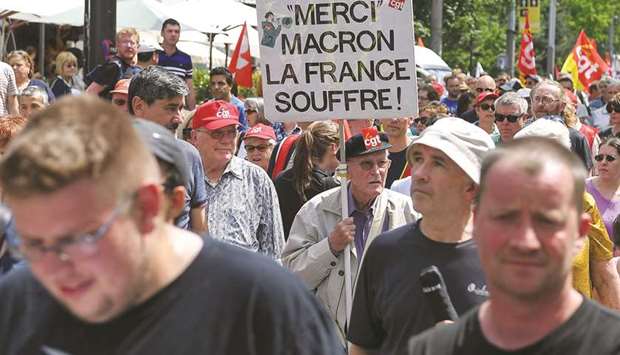It is the third day of major stoppages and demonstrations by public-sector employees since voters last year elected Macron, who has pledged to reduce public spending, trim jobs and reform large parts of the vast French state.
All unions representing civil servants have backed yesterday’s strike, a show of unity last seen around 10 years ago.
Their walkout affected schools and daycare centres, flights and some energy infrastructure, while public transport was also disrupted as some workers took part ahead of the next round of two-day strikes at national rail operator SNCF.
“It’s a message in defence of public services, which is to say a different conception of French society than that held by the president,” CGT union leader Philippe Martinez said at a march by thousands of people in Paris.
The independent consultancy Occurrence estimated that 16,400 people demonstrated in the capital, with many braving a late-afternoon downpour.
The Paris march was marred by black-clad, hooded youths, some wearing ski masks, who broke several windows and threw bottles at police, who responded with teargas and water cannon.
Trouble-makers have infiltrated a number of protests in recent weeks, with more than 100 detained in Paris on the traditional May Day march after torching a McDonald’s restaurant and several vehicles.
Several thousand protestors also gathered in other cities, including about 4,500 in Lyon according to police, part of up to 140 demonstrations expected across the country.
Macron’s centrist government plans public sector reforms next year which would lead to the greater use of contract workers for some services and a cut of 120,000 state jobs by 2022 out of 5.6mn.
It has already maintained a pay freeze, and Olivier Dussopt, the minister in charge of France’s public service, is preparing cost-cutting measures he has said will be “more or less disruptive”.
Many civil servants fear the government plans to scrap their special status and job-for-life privileges, a measure that has already been announced for new recruits on the state railways, the SNCF.
Striking police officers also snarled traffic on the ring road surrounding Paris to defend their status and retirement benefits.
Surveys suggest that the movement is struggling to garner widespread support, with 49% saying they did not back the striking public workers in a ViaVoice poll published by French daily Le Figaro.
Another 40% said they supported the movement.
The poll results largely coincide with those concerning the rail reform, which has sparked one of the longest strike sequences ever on the network.
Some 42% of respondents said the SNCF strike was justified in an Ifop survey published on Sunday by the Journal du Dimanche newspaper, compared with 58% who said it was not.
Rail workers have been striking every two days out of five since April 3.
The strikes have widely affected high-speed services and commuter trains.
However, Macron has vowed not to give in and has promised to deliver on his rail reform and cuts to France’s public spending, which was part of his election manifesto.
France has one of the biggest public sectors in Europe relative to the size of its economy.
The country has not balanced its budget since the 1970s, leading to a public debt equivalent to nearly 100% of GDP.
The unions accuse Macron, a former investment banker, of wanting to destroy public services – a vital source of employment and a pillar of communal life in many parts of the country.
The unions hope turnout will be higher than the last day of action on March 22 when an estimated 300,000 gathered nationwide.
The protests come ahead of a “popular tide” called for Saturday by dozens of associations, leftist parties and unions to support the striking workers and make Macron “back down”.

